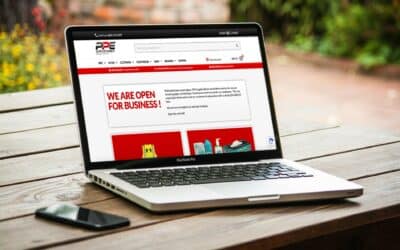We’ve written before about how a comprehensive and ongoing search engine optimisation programme can be one of the most cost-effective ways to promote your brand, products and services online – but if you don’t have time to build a campaign from the ground up, PPC can deliver results much quicker.
For whatever reason you need to make an immediate impact – maybe you’ve pivoted and want to promote a new launch, or the Golden Quarter is around the corner (it starts in November!) and you haven’t prepared – PPC can be your key to online visibility.
What is PPC?
PPC stands for pay-per-click and is a form of online advertising which derives its name from the way you’re billed – your graphic or text will show up on another website for free, then you pay a small fee each time a user clicks it to get to your website.
Some of the world’s most popular websites use this kind of advertising to generate revenue. You’ll find PPC ads at the top and bottom of Google searches – a service known as Google Ads – and Google also allows independent organisations to include adverts on their own websites – through a service known as Google Display Network.
You’ll also see PPC adverts on Facebook, LinkedIn, Twitter, YouTube and plenty more besides.
How does a PPC campaign work?
PPC usually works on an auction system, where you bid to be the advert shown in a certain situation.
For example, on Google, you may bid to be the advert shown when somebody searches for “houses for sale” or “christmas toys”. You’ll select how much you’re willing to pay each time a user clicks your advert, and if you’re the highest bidder, you’re the one displayed. You usually set a maximum budget, which will prevent you from accidentally overspending.
How is PPC different from SEO?
Search engine optimisation is all about creating a website that search engine algorithms like the look of. When a user searches for something you offer, you want to prove yourself as the most likely to be able to provide the right answers.
It involves content (good quality and regularly updated), the technology your website is built on (reliable, quick) and many other factors (does it still look good even on mobile devices?). Getting this right, and being accepted by sites, is a long-term and ongoing project. Results are rarely immediate and sustained success will require regular maintenance and updates.
The key benefit is that it’s effective and, compared with other marketing options, relatively low-cost.
PPC on the other hand, is much quicker. It doesn’t require weeks and months laying foundations. You could be, for example, listed above the top result on Google, in thousands of users’ social media feeds, and on websites around the world, within seconds of clicking the Go button on your campaign.
Of course, websites accepting adverts understand just how valuable this instant visibility is and will charge for the convenience. You’ll pay each time your advert is clicked, whether the user makes a purchase or not, and as soon as your budget is spent, your adverts will disappear as quickly as they appeared.
But in addition to speed, PPC adverts are even more effective. They can be 50 per cent more effective at generating sales than SEO, and some studies suggest that 57 per cent of web users don’t even recognise a PPC ad for what it is – a paid promotion.
Is PPC expensive?
Generally speaking, PPC will cost more than SEO per conversion. But it doesn’t have to break the bank. The smarter you are in creating your campaign, the better return you’ll get on your investment.
Here are a few ways you can streamline a PPC campaign:
- Restrict by location: You can choose to only display adverts to users in specific areas. So if you only want to sell to customers in a particular continent, country, region or town, you can save money by not showing your advert to anybody anywhere else.
- Restrict by demographic: If you know who is and who is not likely to buy from you, you can often choose to only show adverts to those people. Facebook, for example, knows the age, gender, location, hobbies (and many, many more data points) for each of its users. You can take advantage by only showing your advert to your target market.
- Scheduling: You can specify when your adverts will be shown: either all the time, only on Sundays, or only at night. It’s all about calculating when you think you have the best chance of converting a click into a sale.
- Selecting the right keywords: Knowing which keywords are likely to bring in customers is complicated, and must be balanced out with the cost you’re willing to pay. With something as generic as “christmas toys” you may be bidding against thousands of competitors, which will drive the price up. If you don’t have the biggest budget, you can always try to be more specific.
- Ruling out the wrong keywords: In addition to picking which keywords you think potential customers will use to find you, you should also set the keywords by which the wrong people might accidentally find you. That way, somebody searching for something you don’t sell won’t click your advert and cost you money. So if you sell women’s jackets, you could black list “mens”, if you’re a premium product you could rule out “cheap” and it’s especially helpful if your product can be confused with another (someone shopping for eye glasses doesn’t need to see your advert for wine glasses).
- Ongoing reviews: It’s important to constantly review your campaign. Good analytics will show you if some keywords or target audiences are not generating the sales you’d hoped, and those which are performing well and worthy of a greater portion of your budget. Your campaign can be tweaked at any point with just a few clicks.
That’s the beginner’s guide to PPC. It’s effective, it’s quick, it’s infinitely pliable. It might cost more than SEO, overall, but if you need visibility and you need it quick, it’s likely the best option for you right now.
If you would like to know more about how PPC in general or digital marketing in general can help you reach your business goals, reach out to the team for a free, informal chat.
Discuss Your Project With Us
You can either give us a call on 01254 279998
Or complete the contact form below and a member of our team will call you back.


